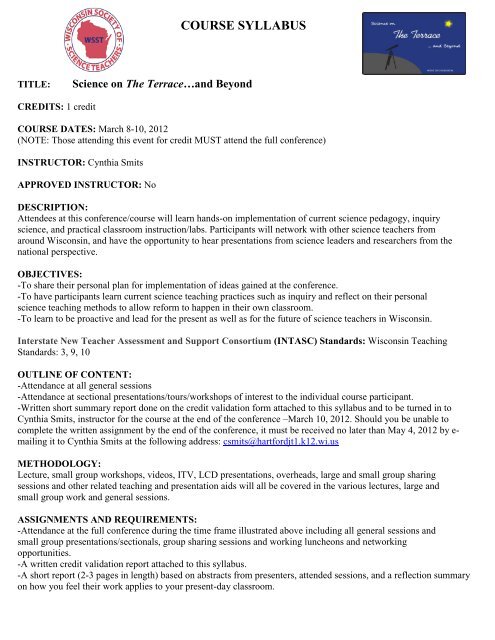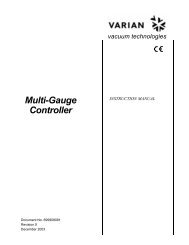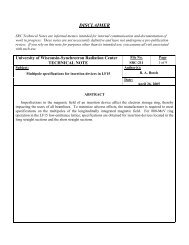COURSE SYLLABUS
COURSE SYLLABUS
COURSE SYLLABUS
You also want an ePaper? Increase the reach of your titles
YUMPU automatically turns print PDFs into web optimized ePapers that Google loves.
<strong>COURSE</strong> <strong>SYLLABUS</strong><br />
TITLE:<br />
Science on The Terrace…and Beyond<br />
CREDITS: 1 credit<br />
<strong>COURSE</strong> DATES: March 8-10, 2012<br />
(NOTE: Those attending this event for credit MUST attend the full conference)<br />
INSTRUCTOR: Cynthia Smits<br />
APPROVED INSTRUCTOR: No<br />
DESCRIPTION:<br />
Attendees at this conference/course will learn hands-on implementation of current science pedagogy, inquiry<br />
science, and practical classroom instruction/labs. Participants will network with other science teachers from<br />
around Wisconsin, and have the opportunity to hear presentations from science leaders and researchers from the<br />
national perspective.<br />
OBJECTIVES:<br />
-To share their personal plan for implementation of ideas gained at the conference.<br />
-To have participants learn current science teaching practices such as inquiry and reflect on their personal<br />
science teaching methods to allow reform to happen in their own classroom.<br />
-To learn to be proactive and lead for the present as well as for the future of science teachers in Wisconsin.<br />
Interstate New Teacher Assessment and Support Consortium (INTASC) Standards: Wisconsin Teaching<br />
Standards: 3, 9, 10<br />
OUTLINE OF CONTENT:<br />
-Attendance at all general sessions<br />
-Attendance at sectional presentations/tours/workshops of interest to the individual course participant.<br />
-Written short summary report done on the credit validation form attached to this syllabus and to be turned in to<br />
Cynthia Smits, instructor for the course at the end of the conference –March 10, 2012. Should you be unable to<br />
complete the written assignment by the end of the conference, it must be received no later than May 4, 2012 by e-<br />
mailing it to Cynthia Smits at the following address: csmits@hartfordjt1.k12.wi.us<br />
METHODOLOGY:<br />
Lecture, small group workshops, videos, ITV, LCD presentations, overheads, large and small group sharing<br />
sessions and other related teaching and presentation aids will all be covered in the various lectures, large and<br />
small group work and general sessions.<br />
ASSIGNMENTS AND REQUIREMENTS:<br />
-Attendance at the full conference during the time frame illustrated above including all general sessions and<br />
small group presentations/sectionals, group sharing sessions and working luncheons and networking<br />
opportunities.<br />
-A written credit validation report attached to this syllabus.<br />
-A short report (2-3 pages in length) based on abstracts from presenters, attended sessions, and a reflection summary<br />
on how you feel their work applies to your present-day classroom.
GRADING/METHODS OF EVALUATION:<br />
Participation and written work should be done at the highest standard of quality and at the graduate level and<br />
needs to include the following: see attached rubric<br />
BIBLIOGRAPHY INFORMATION:<br />
There is no specific textbook that can be recommended. Publications, periodical and newsletter information<br />
from the following presenters is readily accessible and will be required reading by the attendees at the<br />
conference. Please note the presenters whose work is part of the syllabus and whose present publications must<br />
be researched and reviewed in order to complete the assignments/requirements section of this syllabus.<br />
KEYNOTE SPEAKERS:<br />
Friday, March 9, 2012 – Luncheon Speaker<br />
Dr. Nirupama (Rupa) Shevde (UW-Madison Morgridge Institute for Research) Topic: Stem Cell Primer:<br />
Understanding the Science of Stem Cells<br />
Friday, March 9, 2012– Banquet speaker<br />
Tim Samaras (National Georgraphic) Topic: Tornados<br />
Saturday, March 10, 2012– Breakfast Speakers.<br />
Dr. Christina Cruzen (Wisconsin National Primate Research Center at UW-Madison) Topic: Caring for<br />
Nonhuman Primates in a Biomedical Research Program<br />
INFORMATION as of 1/22/12 on sessions, workshops, tours:<br />
Fieldtrips<br />
Thursday AM<br />
9:30 – 12:30 PROMEGA and the BTC Institute (MS, HS)<br />
Thursday PM<br />
12:00 – 3:00 Placon Corporation (MS, HS)<br />
12:00 – 3:00 Thermo Fisher Scientific (MS, HS)<br />
12:15 – 3:00 UW College of Engineering (All)<br />
12:15 – 3:00 Urban Nature Tour (All)<br />
12:15 – 3:00 UW Great Lakes Bioenergy Research Center (MS, HS)<br />
Friday AM<br />
8:30 – 11:30 UW Tour - WID, Geology, and Physics (All)<br />
8:30 – 11:30 UW Biotech, State Lab of Hygiene, and UW Zoology Museum (All)<br />
10:00–11:45 Madison Children’s Museum (Elementary)<br />
10:30 – 3:30 Grapes, Hops, and Rocks (All)<br />
Friday PM<br />
1:00 – 3:00 Henry Vilas Zoo (Elementary)<br />
1:00 – 3:00 Sustainability Tour (All)<br />
General Sessions/Workshops<br />
Statistics and Science: A Vital Connection<br />
Science Reading Needs Science Teachers<br />
Meshing Learning with Play - Facilitating Science Learning at the Madison Children's Museum<br />
Exploring the Framework for K-12 Science Education and Next Generation Science Education Standards<br />
Flipping Your Class: A Roundtable Discussion<br />
FOSS 3rd Edition<br />
Project Lead the Way - A national Best Practice in Project-Based Instruction<br />
The Sky's the Limit: A Cross-disciplinary Collaboration of Science and Art<br />
Connecting Content: Interactive Science Notebook Workshop<br />
How to Build a Better Science Student
High Quality Science Trade Books for 2012<br />
Strategies for Developing Inquiry Based Science Lessons<br />
Collaborating with Universities to Bring MADLI-TOF Mass Spectrometry Into the Classroom<br />
Advanced Features of Vernier LabQuest<br />
Data Collection with Vernier<br />
The Illustrated Novel- A Cross-disciplinary Tool for Stimulating Interest in Science in Bother Higher Education and<br />
High School<br />
Bringing Research into the Science Classroom<br />
The NEW JASON Project<br />
Real Science for Your Students- Research Experience for Teachers<br />
Tree Thinking<br />
Science Clubs and Community Projects: Making Science Interesting and Applicable<br />
Science Teacher's Lounge<br />
Science by Design<br />
Wisconsin Science Education Leadership Association<br />
Bugs, Barbies and Bottle Rockets<br />
Fostering Original, Independent Student Research at the Secondary Level<br />
Science Challenges, Mysteries, Puzzles, and Brainteasers Part 2<br />
Essay Tests: The Fun Way!<br />
Educating in the World of 7 Billion<br />
Social Media, Web Resources, Video Games, and Science Education: Harmonious Marriage or Hostile Cell-Mates<br />
Fusion Science Theater: Using Theater Techniques to Teach Science Concepts<br />
Make UW-Madison Your Destination for Exploration<br />
Biology/Life Science Sessions/Workshops<br />
Principles of Gel Electrophoresis<br />
Scientific Literacy in the Biology Classroom<br />
Do Vampires Walk Among Us?<br />
Eating for Your Eyes<br />
Best of Kay and Ali's Classes<br />
The Carbon Cycle: Quantitative Modeling with Poker Chips and Monitoring soil Microbial CO2<br />
Crazy Traits and Adaptations: Genetics Games for All<br />
Biology Sharing Group Kickoff<br />
Evolution: From Genes to Geology<br />
BioQUEST AP Biology Workshop<br />
Microwave Synthesis of Zinc Nanostructures<br />
Using Nanotechnology to Understand Surface Area and Scale<br />
Joining the UWN Anatomy Academy<br />
Shaking the Family Tree: The Place of New Hominid Fossils<br />
Birds of Prey: Enrapture your Students!<br />
Survey of the Animalia and Plant Kingdoms through the Body Systems<br />
Hook, Line & Thinker - Take Them Fishing!<br />
Physical Science (Including Chemistry & Physics) Sessions/Workshops<br />
Inquiry-Based Chemistry Using Active Chemistry<br />
Investigating the Impact of the Science Writing Heuristic on Student Learning in High School Chemistry<br />
NASA Brings You Newton's Laws of Motion<br />
Atomic Structure--A Natural Approach to Chemistry<br />
Got REAL Issues? Chemistry of Materials and Engineering for Middle Grades<br />
Taking the Matter Lightly<br />
Roller Coaster Ride!<br />
Let's Make Waves and Sound<br />
Pedal Power Bike in Your Classroom?<br />
"Plastic" Surgery<br />
I Spy With My Little Eye…
Chemistry Buffets- A Little Taste<br />
Student Energy Efficiency Project<br />
Chemistry "Foldables"<br />
Bubbleology<br />
Size Matters!<br />
Beat the Ticket Camera<br />
Swing, Roll and Spring with the Building Blocks of Science<br />
Teach Chemistry with Hydrogen and Fuel Cells<br />
A Modeling Unit on Semiconductors<br />
PDQ PDMS<br />
Confronting Misconceptions in Physics/Physical Science<br />
Earth/Space Science Sessions/Workshops<br />
A Walk Through the Solar System<br />
7 Billion and Counting: Lessons for Our Plant's Future<br />
From Antarctica to Your Classroom Through a PolarTREC Expedition<br />
Reading the Rocks--Fossils, Evidence, and Diversity<br />
Using Issues Based Science to Embed Engineering Principles into Earth Science Lessons<br />
Out of this World Activities and Resources<br />
Wisconsin's Aquifers - 3D Model<br />
Is Thar Gold in Them Thar Hills<br />
Students Teaching Astronomy Related Science (STARS) and the Impact to K-5th Grade Students in Oshkosh<br />
Thinking About Biofuels: Making Students Think about their Values<br />
An Activity Exploring Deep Time and Evolution of Life on Earth<br />
Free DataStreme Graduate Course in Earth's Climate System<br />
Green Team Investigations<br />
Hydroponics: Using Project-based Learning to Teach Plant Ecology<br />
Geology in Your Back Yard and of Local Outcrops<br />
Wiggling Worms! An Introduction to Vermicomposting<br />
Hawaii Marine Science Seminar<br />
Urban Solutions to Sustainability<br />
Flying High with SOFIA, NASA's Stratospheric Observatory for Infrared Astronomy<br />
Science Notebooks: Ain't No Mountain High Enough<br />
Global Field Program/Earth Expeditions<br />
Weather Forecasting like a Meteorologist<br />
Star Search: student Citizen Scientists Help Astronomers Search the Sky<br />
Beyond the Choir<br />
Genetics: Gene Regulation and Genetic Engineering<br />
Ecology: Using Flexible Models to Teach Population Dynamics<br />
Mini-Terrarium and Mini-Aquarium Experiments<br />
Science Futures 2012<br />
Environmental Science Sessions/ Workshops<br />
Add a Long-Term environmental Study to your Curriculum<br />
Ideas for Teaching Wildlife Conservation<br />
Flying WILD!<br />
Climate Literacy Ambassadors<br />
Teaching Macroevolution and Phylogenetics through Biodiversity and Conservation Management<br />
Professional Development Sessions/Workshops<br />
Formative Assessment in the Science Classroom<br />
Making Sense of Science Overview<br />
Making Sense of Science Hands-on Experience<br />
A Journey with Science Notebooking<br />
Going Digital in Secondary Science
Moodle in the Science Classroom<br />
Writing and Thinking Skills in Science<br />
Implementation of a Standards-Based Classroom<br />
Classroom Management: What They Don't Teach You in College!<br />
Using Inquiry Methods to Teach Basic Physics<br />
Using Inquiry to Teach the Scientific Method<br />
Performance-Based Assessments<br />
Cooperative Learning: Four Heads are Better Than One<br />
Models of Inquiry<br />
What Are You Doing While Your Students Are Working?<br />
It's Time to BLEND Your Classroom: ADD some BLEND ED<br />
Transitioning from High School to College in the Sciences<br />
Use Scaffolding Inquiry to Move Students Along the Continuum of Inquiry (Directed to Guided to Connected to<br />
Full/Open Inquiry)<br />
Common Core Framework-Practices, Cross-cutting Concepts & Core Ideas<br />
Designing and Learning from Inquiry Lessons Through a Collaborative Lesson-Study Approach<br />
Using Public Media in the Science Classroom<br />
STEM Sessions/Workshops<br />
Collaborative Communities in STEM Education (C2STEM): Recruiting & Retaining Underrepresented Preservice<br />
Teachers<br />
Building Community Collaboration: Family STEM Nights<br />
Teaching Engineering Concepts in Traditional Science Classes<br />
Launching STEM Interest: Using Rockets to Propel to Excel in STEM<br />
Get to the STEM of Learning<br />
Integrating Engineering and Science<br />
STEM Solutions for Elementary and Middle School<br />
Problem-Solving Process in Science and Engineering<br />
Family Engineering: Bringing STEM to Elementary Children and Their Families<br />
Engineering is Elementary: Integrating Engineering and Technology with Elementary Science<br />
Putting the E back in STEM: Meeting the New Engineering Standards through Case Study Curriculum<br />
Exploring Stem Cells in the Classroom<br />
Implementing STEM in Your Classroom with Carolina Curriculum and the Smithsonian Institution<br />
What Engineers Want Science Teachers to Know About Engineering<br />
Meeting the Middle School STEM Challenge<br />
(PLEASE NOTE: Abstracts on all presentations in tours, sessions, workshops and keynotes can be found in<br />
your program for ease of reporting and final paper production).<br />
Americans with Disabilities Act:<br />
If you are a student with a disability and require auxiliary aids, services or accommodations for this<br />
conference/course, please see the instructor to discuss your accommodation needs.
















